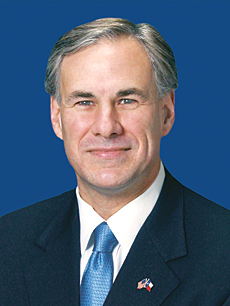By Janet Elliott, Staff Writer
AUSTIN – As he watches next week’s oral arguments on the health reform law’s constitutionality play out before the U.S. Supreme Court, Texas Attorney General Greg Abbott will have done as much as anyone in the courtroom to develop the legal challenge.
From fighting the “Cornhusker Kickback” to selecting the lawyer who will present arguments for Texas and 25 other states, Abbott has been a leader in framing the case against the Affordable Care Act.
Texas was one of just a handful of states that started raising legal issues in 2009 when it became known that Nebraska Senator Ben Nelson had added language to the legislation to exempt his state from the cost of the mandated expansion of Medicaid.

As the carve-out for Nebraska was stripped and the bill proceeded toward passage, more states joined the protest. Texas was one of 13 states that filed the legal challenge on the day President Obama signed the bill into law, March 23, 2010.
Abbott helped shape what would become the key arguments over the mandate that all individuals purchase health insurance or pay a fine, and the requirement that states participate in the Medicaid expansion or lose all their matching funds from the federal government.
“Based upon a lot of research that had been done, we keyed in on those two arguments and pressed them onward in federal district court, where we won, and then at the court of appeals where we won again. And it’s the same two primary arguments we have before the United States Supreme Court,” Abbott said.
The case was filed in Florida because that state was viewed as the best venue, a decision that turned out to be correct. The U.S. Court of Appeals for the 11th Circuit, which has jurisdiction over Florida, found the health reform law unconstitutional, while federal appeals courts in District of Columbia and Michigan upheld other challenges to the law.
An executive committee of Texas, Colorado, Florida, Nebraska, South Carolina and Washington made strategy decisions, including selecting Paul Clement as outside counsel. Clement, a partner in Washington D.C.’s Bancroft firm, was Solicitor General under President George W. Bush and has argued 55 cases before the Supreme Court.
Abbott first met Clement in 2005 when they shared argument time in the case over a Ten Commandments monument on the Texas Capitol grounds. The Supreme Court ruled in favor of Texas, finding the monument is a constitutional acknowledgment of religion.
“It was my first exposure to his legal brilliance and his appellate abilities,” said Abbott.
The Texas AG’s Solicitor General Jonathan Mitchell has been the main point of contact with Clement with edits to the Supreme Court briefs. Mitchell is a former assistant professor at George Mason University’s law school who clerked for Justice Antonin Scalia.
Clement will be joined by Michael Carvin, a Jones Day partner, who represents the National Federation of Independent Business and some individuals who oppose the law.
Representing the Obama Administration will be Solicitor General Donald Verrilli, a seasoned Supreme Court practitioner and former Jenner & Block partner. He will argue that the decision not to purchase health insurance has an economic effect, making it within the federal government’s Commerce Clause authority to regulate multi-state economic activity.
The court is hearing six hours of arguments over three days. Monday will focus on jurisdictional issues about whether the case is ripe to be heard yet, since the individual mandate doesn’t go into effect until 2014. The focus Tuesday will be on the individual mandate and the discussion Wednesday will center on the Medicaid expansion and whether the rest of the law could stand if the individual mandate is struck down.
Abbott, a former justice on the Texas Supreme Court, will attend all six hours of argument. He disputes recent newspaper opinion articles claiming that the court’s conservative justices might uphold the law, based on their prior rulings.
“There is no precedent on this case whatsoever, and the court will be making new law and will certainly be expanding the Constitution if it were to uphold Obamacare,” said Abbott. “To strike down Obamacare does not require the court to reverse any case or take a different stand on any case it has ruled on in the past.”
PLEASE NOTE: Content of The Texas Lawbook is controlled and protected by specific licensing agreements with our subscribers and under federal copyright laws. Any distribution of this content without the consent of The Texas Lawbook is prohibited.

Leave a Reply
You must be logged in to post a comment.